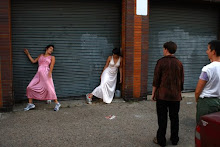I listened to a great interview today on Bad at Sports that I thought I'd share with the NWAA community. Young artists with a considerable amount of student loan debt should listen to this... I'm now a big fan of Nato Thompson, our developing community needs to get familiar with his project! - Michael Kalmbach, the Dr. Dre of NWAA.

http://badatsports.com/2010/episode-250-nato-thompson/
Here's another interview I found while I was watching Part 2 of the New York City Housewives' reunion show with Rebecca tonight:
Interview with Nato Thompson
By Lauren Cornell on Wednesday, February 27th, 2008 at 2:57 pm.
NT: I have always held the political angle of the avant-garde as a necessary and important history. The political drive behind those ambitious enough to make their dreams a reality does not come out of an interest in art per se, but the interest in producing meaning on a large level. A basic Marxist idea (that I think is quite apparent) is that the way we think is produced in the way we live. So, those interested in producing a more robust form of living must take seriously the economic and social forms that produce our world. These are hardly separate projects.
But I must qualify, that this trajectory isn't in terms of pure ambition but, ultimately, in interrogating the social forms that produce our world. It might sound naïve, but I still am hopeful that we can find a way to produce a system of organization which guarantees equal rights for every one on the planet. At times, artists are interested (not always in the most straightforward methods) in producing this type of world. In others, their actions point toward liberatory gestures and forms of meaning that are resistant in their buoyancy.
Institutional critique was a necessary maneuver to show that the art world, like all other forms of discourse, is run via power. The next step is to contextualize this framework among the various other discourses and try to lay out a specifically strategic campaign for meaning production. It seems naïve to point out that power solely lives in institutions. It is everywhere!
RIGHT ON!
Here's the link for the rest of this interview: http://rhizome.org/editorial/4

































No comments:
Post a Comment